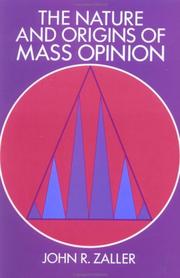| Listing 1 - 4 of 4 |
Sort by
|
Book
ISBN: 2717822844 9782717822847 Year: 1992 Volume: vol *19 Publisher: Paris : Economica - anthropos,
Abstract | Keywords | Export | Availability | Bookmark
 Loading...
Loading...Choose an application
- Reference Manager
- EndNote
- RefWorks (Direct export to RefWorks)
Sondages d'opinion --- Public opinion polls --- Handbooks, manuals, etc.
Book
ISBN: 2800410566 9782800410562 Year: 1992 Publisher: Bruxelles Paris Editions de l'Université de Bruxelles Editions d'organisation
Abstract | Keywords | Export | Availability | Bookmark
 Loading...
Loading...Choose an application
- Reference Manager
- EndNote
- RefWorks (Direct export to RefWorks)
Opiniepeilingen --- Public opinion polls --- Sociologie --- Sondages d'opinion --- Social sciences --- Questionnaires --- Methodology --- E090085.jpg --- Enquêtes --- Social sciences - Methodology --- Enquête --- Echantillonnage (statistique)
Book
ISBN: 2100011316 Year: 1992 Publisher: Paris : Dunod,
Abstract | Keywords | Export | Availability | Bookmark
 Loading...
Loading...Choose an application
- Reference Manager
- EndNote
- RefWorks (Direct export to RefWorks)
Telephone surveys --- Public opinion polls --- Enquêtes par téléphone --- Sondages d'opinion --- Enquêtes par téléphone --- Enquête --- Questionnaire --- Sondage d'opinion

ISBN: 9780521407861 9780521404495 9780511818691 0521407869 0511818696 9781139640916 1139640917 9781139648554 1139648551 9781316084687 131608468X 9781139635745 1139635743 0521404495 1139647555 9781139647557 1139638076 9781139638074 Year: 1992 Publisher: Cambridge : Cambridge University Press,
Abstract | Keywords | Export | Availability | Bookmark
 Loading...
Loading...Choose an application
- Reference Manager
- EndNote
- RefWorks (Direct export to RefWorks)
In this 1992 book John Zaller develops a comprehensive theory to explain how people acquire political information from elites and the mass media and convert it into political preferences. Using numerous specific examples, Zaller applies this theory to the dynamics of public opinion on a broad range of subjects, including domestic and foreign policy, trust in government, racial equality, and presidential approval, as well as voting behaviour in U.S. House, Senate, and presidential elections. The thoery is constructed from four basic premises. The first is that individuals differ substantially in their attention to politics and therefore in their exposure to elite sources of political information. The second is that people react critically to political communication only to the extent that they are knowledgeable about political affairs. The third is that people rarely have fixed attitudes on specific issues; rather, they construct 'preference statements' on the fly as they confront each issue raised. The fourth is that, in constructing these statements, people make the greatest use of ideas that are, for various reasons, the most immediately salient to them. Zaller emphasizes the role of political elites in establishing the terms of political discourse in the mass media and the powerful effect of this framing of issues on the dynamics of mass opinion on any given issue over time.
Mass communications --- Political sociology --- Attitude (Psychology) --- Political psychology --- Public opinion --- Public opinion polls --- Attitude (Psychologie) --- Psychologie politique --- Opinion publique --- Sondages d'opinion --- Public opinion. --- Politics, Practical - Psychological aspects. --- Public opinion polls. --- Attitude (Psychology). --- Political psychology. --- #SBIB:014.IO --- #SBIB:309H271 --- #SBIB:324H50 --- #SBIB:35H510 --- 316.77 --- 316.77 Communicatiesociologie --- Communicatiesociologie --- Opinion polls --- Polls, Public opinion --- Public opinion research --- Straw votes --- Social surveys --- Market surveys --- Opinion, Public --- Perception, Public --- Popular opinion --- Public perception --- Public perceptions --- Judgment --- Social psychology --- Focus groups --- Reputation --- Mass political behavior --- Political behavior --- Political science --- Politics, Practical --- Psychology, Political --- Psychology --- Attitudes (Psychology) --- Stereotypes (Social psychology) --- Politieke communicatie: toepassingsgebieden --- Politieke participatie en legitimiteit (referenda, directe democratie, publieke opinie...) --- Openbaarheid van bestuur, ombudsdienst, .. --- Research --- Psychological aspects --- Monograph --- Openbaarheid van bestuur, ombudsdienst, . --- Openbaarheid van bestuur, ombudsdienst, --- Social Sciences --- Political Science
| Listing 1 - 4 of 4 |
Sort by
|

 Search
Search Feedback
Feedback About
About Help
Help News
News